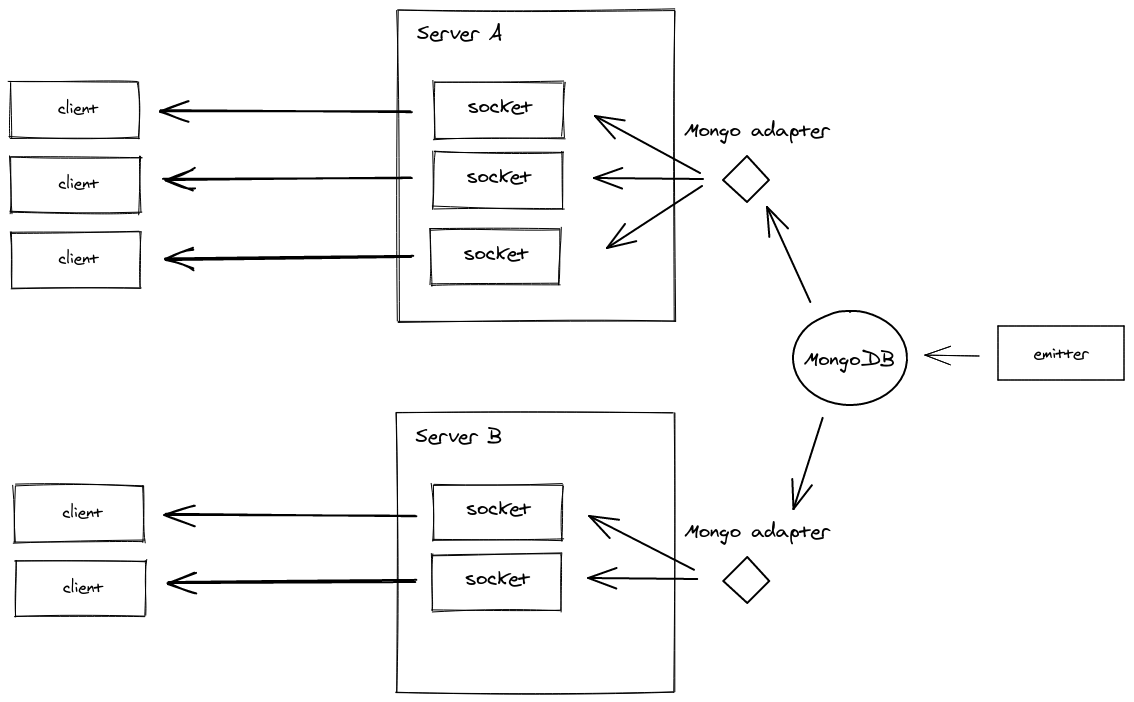Socket.IO MongoDB emitter
The @socket.io/mongo-emitter package allows you to easily communicate with a group of Socket.IO servers from another Node.js process (server-side).
It must be used in conjunction with @socket.io/mongo-adapter.
Supported features:
Related packages:
- MongoDB adapter: https://github.com/socketio/socket.io-mongo-adapter/
- Redis adapter: https://github.com/socketio/socket.io-redis-adapter/
- Redis emitter: https://github.com/socketio/socket.io-redis-emitter/
- Postgres adapter: https://github.com/socketio/socket.io-postgres-adapter/
- Postgres emitter: https://github.com/socketio/socket.io-postgres-emitter/
Table of contents
Installation
npm install @socket.io/mongo-emitter mongodb
For TypeScript users, you might also need @types/mongodb.
Usage
const { Emitter } = require("@socket.io/mongo-emitter");
const { MongoClient } = require("mongodb");
const DB = "mydb";
const COLLECTION = "socket.io-adapter-events";
const mongoClient = new MongoClient("mongodb://localhost:27017/?replicaSet=rs0", {
useUnifiedTopology: true,
});
const main = async () => {
await mongoClient.connect();
const mongoCollection = mongoClient.db(DB).collection(COLLECTION);
const io = new Emitter(mongoCollection);
setInterval(() => {
io.emit("ping", new Date());
}, 1000);
}
main();API
Emitter(mongoCollection[, nsp])
const io = new Emitter(mongoCollection);The mongoCollection argument is a MongoDB collection object from the mongodb package.
Emitter#to(room:string):BroadcastOperator
Emitter#in(room:string):BroadcastOperator
Specifies a specific room that you want to emit to.
io.to("room1").emit("hello");Emitter#except(room:string):BroadcastOperator
Specifies a specific room that you want to exclude from broadcasting.
io.except("room2").emit("hello");Emitter#of(namespace:string):Emitter
Specifies a specific namespace that you want to emit to.
const customNamespace = io.of("/custom");
customNamespace.emit("hello");Emitter#socketsJoin(rooms:string|string[])
Makes the matching socket instances join the specified rooms:
// make all Socket instances join the "room1" room
io.socketsJoin("room1");
// make all Socket instances of the "admin" namespace in the "room1" room join the "room2" room
io.of("/admin").in("room1").socketsJoin("room2");Emitter#socketsLeave(rooms:string|string[])
Makes the matching socket instances leave the specified rooms:
// make all Socket instances leave the "room1" room
io.socketsLeave("room1");
// make all Socket instances of the "admin" namespace in the "room1" room leave the "room2" room
io.of("/admin").in("room1").socketsLeave("room2");Emitter#disconnectSockets(close:boolean)
Makes the matching socket instances disconnect:
// make all Socket instances disconnect
io.disconnectSockets();
// make all Socket instances of the "admin" namespace in the "room1" room disconnect
io.of("/admin").in("room1").disconnectSockets();
// this also works with a single socket ID
io.of("/admin").in(theSocketId).disconnectSockets();Emitter#serverSideEmit(ev:string[,...args:any[]])
Emits an event that will be received by each Socket.IO server of the cluster.
io.serverSideEmit("ping");Known errors
TypeError: this.mongoCollection.insertOne is not a function
You probably passed a MongoDB client instead of a MongoDB collection to the Emitter constructor.

